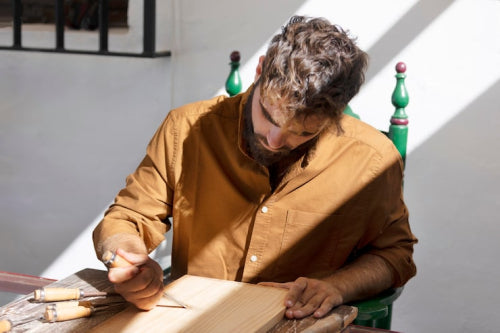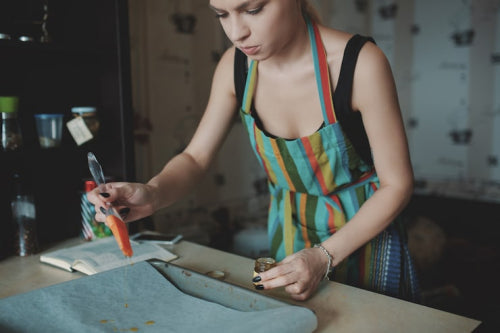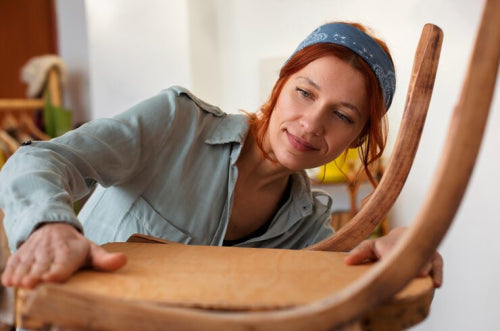In Bangalore's vibrant workshops, the whir of CNC routers harmonizes with the steady rhythm of hand-carved details, producing furniture that feels both eternal and cutting-edge. Across India's urban centers Jaipur's heritage-laden studios, Mumbai's sleek design hubs, Chennai's coastal ateliers a transformation is underway. Artisans are wielding technology not to supplant their craft but to elevate it, crafting pieces that fuse precision with the warmth of human touch. This convergence is driving a surge in India's custom furniture market, projected to grow at a robust 12% CAGR from 2024 to 2030, fueled by rising demand for personalized interiors in cities like Hyderabad, Pune, and Ahmedabad.
Mass-market furniture lacks heart, filling rooms with bland, short-lived pieces. Frequent breakdowns spark frustration, as replacements erode style and sentiment. At MMC Wood Creations, Udaipur artisans shape heirloom furniture with enduring craftsmanship and cozy elegance, creating pieces that echo your identity, ensuring your home radiates warmth and timeless connection. Shop Now!
Smart Craft: Indian Artisans Blend Tradition with Technology
At the heart of this evolution are studios like MMC Wood Creations, where the aroma of sheesham and teak blends with the glow of digital design screens. This boutique brand specializes in cane and wooden furniture, offering affordable yet durable pieces that transcend seasonal trends with classic, timeless designs. Their focus on outdoor furniture taps into strong demand on platforms like Instagram, where urban buyers seek luxury that's practical for daily life. What distinguishes MMC is its seamless integration of digital tools, ensuring modern precision while preserving the soul of artisanal craftsmanship.
In cities like Bangalore and Pune, CNC woodworking tools, part of a market valued at USD 8.2 billion in 2025, are revolutionizing production. These machines deliver intricate joinery with unmatched accuracy, slashing the time once spent on manual carving. In Jaipur, artisans employ laser measurement tools to replicate traditional patterns efficiently, safeguarding cultural heritage while meeting modern demands. Mumbai's design firms, meanwhile, use 3D visualization and virtual reality to let clients preview bespoke furniture, ensuring every detail aligns perfectly with their vision.
Redefining Craftsmanship with Technology
Digital tools have become indispensable in India's woodworking hubs. Bangalore's workshops leverage parametric modeling to design ergonomic furniture, allowing real-time adjustments for both comfort and aesthetics. In Pune, small studios adopt CAD/CAM systems to streamline production, minimizing errors and waste. Industry projections indicate the woodworking CNC tools market will reach USD 13.3 billion by 2035, growing at a 5% CAGR, driven by demand for automated solutions in furniture manufacturing and modular construction.
In Chennai, where coastal humidity tests wood's resilience, AI-driven material selection is gaining ground. Algorithms help choose woods and finishes optimized for durability, ensuring outdoor pieces withstand harsh conditions. Kolkata's workshops are embracing IoT-enabled drying systems, which monitor moisture to prevent cracking and reduce wood waste by up to 25%. These innovations align with MMC Wood Creation's commitment to sustainability, using digital tracking to verify ethical sourcing of sheesham and teak, resonating with eco-conscious buyers in Hyderabad and Ahmedabad.
Across India, technology is enabling mass customization. Mumbai's homeowners can order bespoke bookshelves tailored to their spaces, while Bangalore's rapid prototyping ensures quick delivery without sacrificing quality. In Ahmedabad, modular joinery systems with smart sensors cut waste by 20–25%, boosting efficiency and supporting export-ready production. Such advancements allow brands like MMC to deliver on their promise of durable, aspirational furniture that balances luxury with practicality.
Real-World Impact: Stories from the Workshop
In Bangalore, a hybrid workshop buzzes as artisans hand-finish CNC-cut table legs, preserving the subtle imperfections that define handmade allure. Jaipur's ateliers use laser-etching tools to carve intricate motifs into headboards, scaling traditional designs for online marketplaces while retaining cultural depth. Hyderabad's e-commerce platforms thrive on made-to-order demand, with MMC Wood Creations showcasing cane loungers and wooden dining sets on Instagram, drawing urban buyers seeking affordable elegance.
In Ahmedabad, workshops pioneer modular joinery, using smart sensors for precise cuts that minimize waste and enhance consistency. This precision supports global export markets, where quality is paramount. Draw2Cut, an innovative system, allows artisans to sketch designs directly onto materials, translating them into CNC toolpaths. This open-source platform simplifies the design-to-fabrication process, empowering small studios to compete with larger manufacturers.
Kolkata's workshops, meanwhile, integrate IoT systems to optimize wood curing, ensuring longevity and reducing environmental impact. These advancements reflect a broader trend: technology isn't replacing artisans but amplifying their craft, enabling them to meet modern demands while honoring tradition.
Challenges of Merging Craft and Code
Adopting technology comes with hurdles. CNC routers and 3D scanners carry high costs often lakhs of rupees making them inaccessible for smaller studios in Kolkata and Jaipur. Training poses another challenge. In Pune and Chennai, artisans require cross-skilling to master digital tools, bridging the divide between traditional craftsmanship and technical expertise. There's also the question of aesthetics: does machine precision diminish the organic charm of handmade work? For MMC Wood Creations, their “new brand” status demands proving that technology enhances, rather than overshadows, their artisanal value.
Yet the benefits outweigh the obstacles. Digital tools enable rapid prototyping, allowing Bangalore studios to deliver custom pieces faster. In Mumbai, 3D visualization ensures client satisfaction, reducing revisions. Digital certificates tracking wood origins and artisan contributions a potential innovation for MMC build trust among buyers who prioritize transparency and sustainability.
Global Opportunities and Sustainable Growth
The fusion of craft and technology opens global markets for Indian artisans. Jaipur's handcrafted furniture, now produced with consistent precision, is poised for export, while Hyderabad's online platforms connect artisans to international buyers. The hand tools and woodworking tools market, valued at USD 9.96 billion in 2025, is projected to reach USD 14.21 billion by 2034, with a 4.03% CAGR, driven by Asia Pacific's dominance in construction and infrastructure projects.
Sustainability is a key driver. Smart tools ensure precise cuts and durable finishes, extending product lifespans and aligning with MMC's ethos of practical luxury. In Kolkata, IoT systems optimize curing processes, while Ahmedabad's modular designs reduce waste, appealing to eco-conscious urban consumers. These advancements position Indian woodworking to meet both local and global demand for sustainable, high-quality furniture.
A Future of Craft and Innovation
Over the next five years, collaboration between tech startups and artisan guilds will deepen. Bangalore's IISc is advancing material engineering for sustainable woods, while Ahmedabad's CEPT University drives digital fabrication research. Small studios can adopt technology incrementally starting with 3D visualization before investing in CNC machines while training programs bridge the skill gap. For MMC Wood Creations, the challenge is to balance innovation with authenticity, ensuring every piece reflects the artistry of human hands enhanced by digital precision.
India's woodworking landscape is at a turning point. From Chennai's coastal workshops to Mumbai's design studios, artisans are proving that tradition and technology are not at odds but in harmony. With every CNC-carved table and 3D-visualized chair, they're shaping a future where Indian furniture is both functional and exquisite, redefining luxury for a global audience. As the line between handmade and high-tech fades, brands like MMC Wood Creations are crafting a legacy that's as enduring as the wood they shape.
Frequently Asked Questions
How are Indian artisans using technology in custom woodworking?
Indian artisans are integrating CNC routers, laser measurement tools, and 3D visualization software to enhance traditional craftsmanship without replacing it. Cities like Bangalore, Mumbai, and Jaipur are seeing workshops combine digital precision with hand-finishing techniques to create furniture that's both accurate and retains handmade character. Technologies like CAD/CAM systems and IoT-enabled wood drying are helping reduce waste by 20-25% while enabling mass customization for urban buyers seeking personalized interiors.
What are the benefits of CNC machines for custom furniture makers in India?
CNC woodworking tools deliver intricate joinery with exceptional accuracy while significantly reducing production time compared to manual carving. The woodworking CNC tools market, valued at USD 8.2 billion in 2025, enables small studios to achieve consistent precision for export-quality furniture and allows rapid prototyping for faster custom piece delivery. These machines also minimize material waste through precise cuts and help artisans scale traditional designs for online marketplaces while preserving cultural authenticity.
Is technology-assisted woodworking sustainable for eco-conscious furniture buyers?
Yes, technology integration actually enhances sustainability in custom woodworking. Digital tools enable precise cuts that reduce wood waste by up to 25%, while IoT-enabled drying systems prevent cracking and optimize material usage. AI-driven material selection helps choose durable woods and finishes for longevity, extending product lifespans, and digital tracking systems can verify ethical sourcing of materials like sheesham and teak all aligning with the values of eco-conscious consumers in India's growing sustainable furniture market.
Disclaimer: The above helpful resources content contains personal opinions and experiences. The information provided is for general knowledge and does not constitute professional advice.
You may also be interested in: The Global Appeal of Indian Artisan Furniture
Mass-market furniture lacks heart, filling rooms with bland, short-lived pieces. Frequent breakdowns spark frustration, as replacements erode style and sentiment. At MMC Wood Creations, Udaipur artisans shape heirloom furniture with enduring craftsmanship and cozy elegance, creating pieces that echo your identity, ensuring your home radiates warmth and timeless connection. Shop Now!
Powered by flareAI.co




